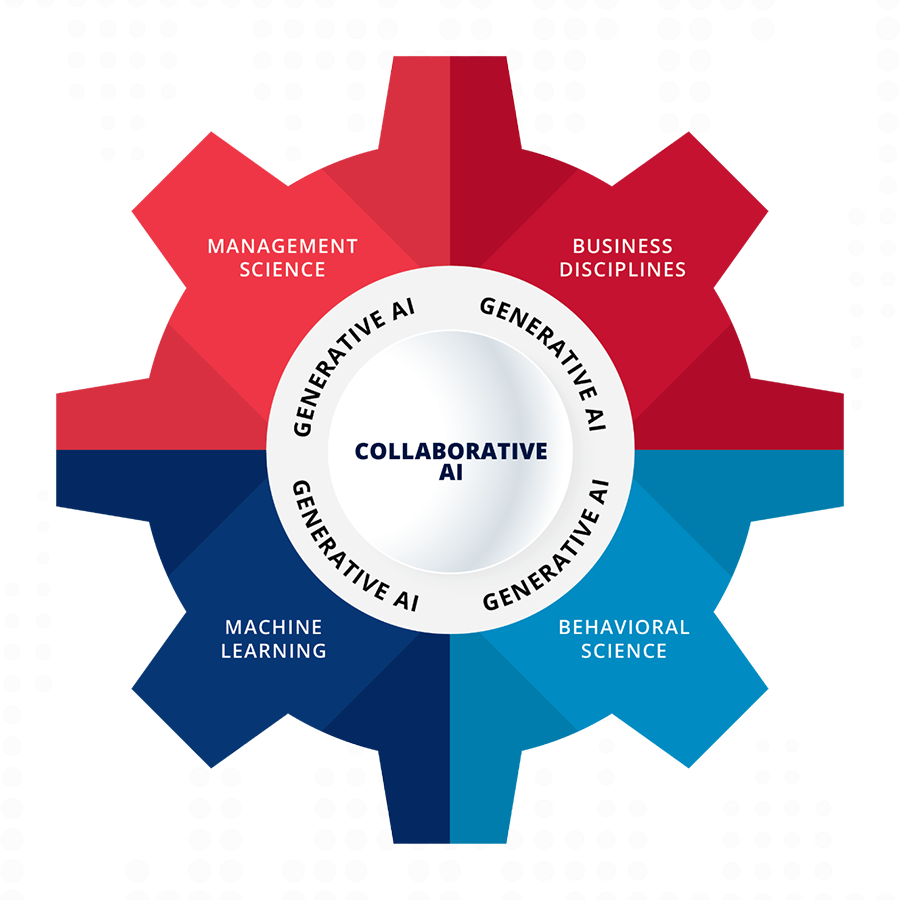
CIB Teaching Fellows Develop Human-Centered, AI-Powered Educational Tools That Enhance Critical Thinking and Improve Interpersonal Communication
By Dr. Emily Barrow DeJeu
As artificial intelligence continues to reshape the future of work, Tepper faculty are reimagining how they prepare students to lead in a rapidly evolving landscape. The CIB’s Collaborative AI fellows are at the forefront of this transformation: their AI-powered tools aim to enhance the student learning experience. Collectively, these initiatives equip students with more than just technical knowledge. They offer hands-on opportunities to build critical human skills like giving constructive feedback, navigating ethical dilemmas, recognizing cognitive biases, and communicating across cultures.
Two of these tools leverage a powerful new custom-built platform called Interactive Case Analysis, which transforms traditional case-based business education by simulating real-world decision-making through dynamic, personalized case studies:
- John Gasper’s interactive case study helps students explore how cognitive biases influence decision-making, particularly in behavioral economics. Each student is randomly assigned a case in which they interview an AI agent, "Jordan," who has made a hiring decision influenced by a specific cognitive bias. Unlike traditional static case studies, this interactive tool’s dynamic and randomized format encourages deeper critical thinking, real-world application, and active engagement. Early feedback shows strong usability and positive student perception, and the system is being designed for expansion with additional cases in future semesters.
- Christopher Peace and Rima Bhattacharyay’s interactive case study features two AI-powered agents representing CEOs from non-Western cultural backgrounds and is designed to help students practice professional, cross-cultural communication. Students engage in polite small talk before strategically steering the conversation toward a potential business collaboration, aiming to demonstrate key intercultural skills like respect for hierarchy, adaptability to different conversational styles, and sensitivity to etiquette. The tool evaluates student performance using a course-specific rubric, allowing for varied conversation paths while maintaining clear assessment standards. This project addresses the need for realistic, low-stakes practice in navigating cultural nuance and communication styles in global professional contexts.
Learn more about Tepper’s pioneering new Interactive Case Analysis here: https://www.youtube.com/watch?v=jgx-qpHecb0
Two additional tools function not as interactive roleplaying simulators but as coaches that aim to sharpen students’ reasoning and improve the quality of their work:
- Abbe Depretis’s “Feedback-on-Feedback” tool helps students improve the quality of the feedback they give to peers during presentation assignments. It addresses a common issue in classrooms: peer feedback is often vague, unhelpful, or ignored altogether. This AI-powered tool analyzes students’ comments against an expert-created rubric and provides suggestions for making their feedback more specific, balanced, and actionable—prompting students to revise their input in real time. For students, this iterative practice builds essential feedback-giving skills, and early survey data suggests students find their feedback more useful and engage with it more frequently since the tool’s deployment.
- Derek Leben’s “Ethics Coach” is an AI-powered educational tool designed to critique students’ arguments and help them strengthen their ethical reasoning. Originally piloted in the fall, the tool is now being improved by training it on past lecture content to enhance its ability to evaluate student work. Unlike typical tutors, this tool will have memory, allowing it to engage students in more personalized, iterative feedback. By encouraging students to refine and reflect on their ideas, this tool promotes deeper, sharper thinking and more robust ethical analysis.
These AI-powered educational tools are more than experiments – they represent a shared commitment to innovation in business education. By blending the strengths of human-centered pedagogy with the capabilities of artificial intelligence, these projects offer a glimpse into the future of learning: one that is interactive, personalized, and deeply attuned to the complex demands of leadership today. As these tools continue to evolve, they hold promise not just for students but for the corporate and academic partners invested in preparing the next generation of business leaders.